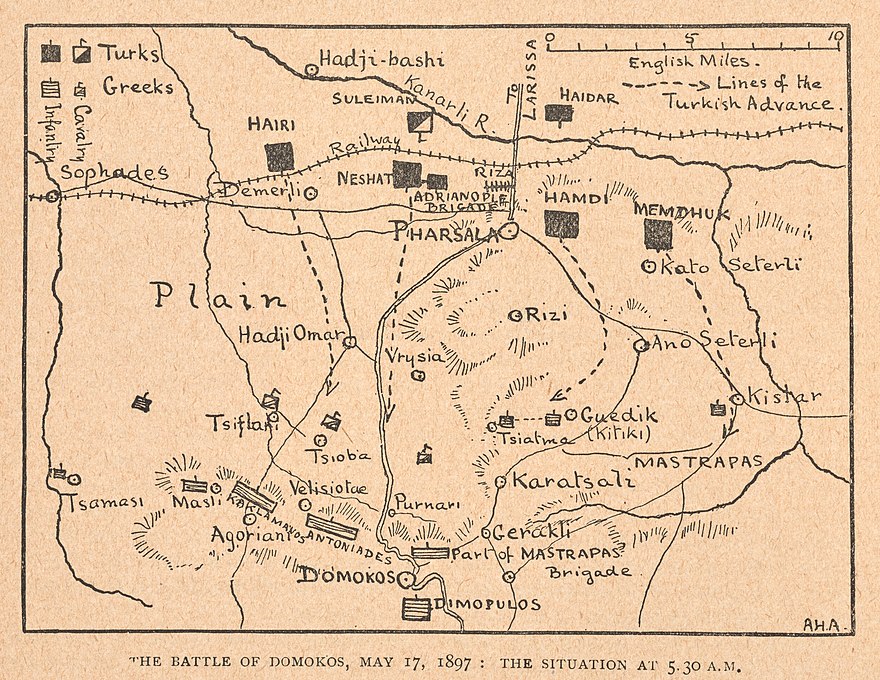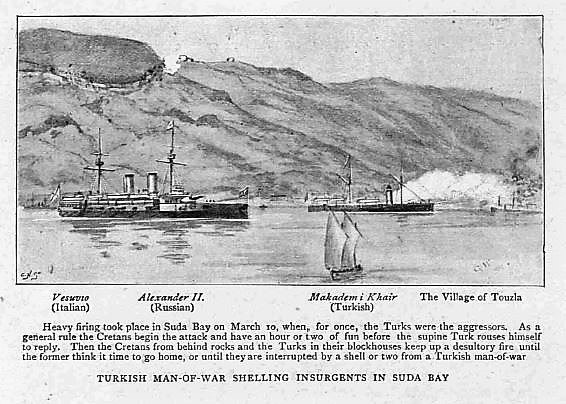was won by the Turkish land forces, sparing the debilitated
Turkish Navy from embarrassment. Hasan Rami Paşa, was
then the Ottoman fleet's commander and at odds with
then-Navy Minister Bozcaadalı Hasan Hüsnü Paşa, who
held that office for 23 years, until his death in 1903.
In this portion of Hasan Rami Paşa's self-defense, as he
faced accusations of crimes by the ascendant Young Turks
in 1908, he thoroughly casts the blame for the sorry state
of the Turkish Navy during the war and beyond on his
rival Hasan Hüsnü Paşa and makes the claim that he
proposed the reestablishment of 'Meşrutiyet'
(constitutional government) during that war.//
turkey-greek war 1897 click here for some background
on this war.

Ottoman Navy Minister (1881-1903) Bozcaadalı
Hasan Hüsnü Paşa.
After serving as a ship's officer, I was assigned to the command of the
shipyard and spent 12 years in this duty. This was a sorrowful time for
the Navy because the late Hasan Hüsnü Paşa of Bozca Ada (Bozca
Island) was the Navy Minister and he left the war fleet locked in the
Golden Horn, where the ships deteriorated from idleness and the
training of officers and sailors was neglected - a death sentence for
the virtues of civilization. The warships were incapable of facing an
enemy or even moving from their anchorages. Yet, the Navy Minister
seemed to be pleased at having brought the Ottoman Navy to its knees
in this way.
Each day in the Golden Horn, millions of liras went to waste as the
Ottoman Navy became second-rate, when compared to the other navies
of the world. I could not bear to see the soiled and shabby clothes worn
by the warships' crews but I was powerless to do anything about them,
per the orders of the Navy Ministry. At the outset of the war with Greece
(1897), I was assigned to command the Ottoman fleet that was able to
make it as far as Kale-i Sultaniye (Çanakkale/Gallipoli) from Istanbul.
The war fleet was in such poor condition that it was dangerous for these
ships, left idle in the Golden Horn for so many years, to venture out to
sea but the fact that they did was perceived as something of a success.

A view of the Golden Horn Shipyard in 1900.
So, this crippled war fleet set out from the Golden Horn en route to
Kale-i Sultaniye at fifteen past 10 on the night of Saturday the sixth of
March in 1313 (1897). The frigate Mesudiye, this fleet's most important
element, had 3 of its boilers explode as the ship passed under the two
bridges at the entrance to the Golden Horn. The Mesudiye was forced to
tie up at İmralı Island and limped to Lapseki port the next day,
accompanied by six or seven other ships. The armored frigate Hamidiye
was taking on water and was serviced at Lapseki, as well. But on the
orders of the Sultan, the war fleet was commanded to proceed to Kale-i
Sultaniye after three or four days at Lapseki, come what may.
Upon arrival at Kale-i Sultaniye, I had a technical committee formed to
inspect the warships and torpido steamboats. The results of the inspection
were alarmingly bad. None of our warships were trustworthy and on all
of the torpido steamboats their boiler pipes had all leaked in the course of
just one night's journey. I found both the officers and sailors to be weak
in their duty knowledge so I had them review the booklets on, especially,
torpido steamboat attacks on enemy ships and reconnaissance.

Meanwhile, the Turkish Army faired better against the Greeks
at the battle of Domokos on the Plain of Thessaly in central
Greece.
Kale-i Sultaniye at fifteen past 10 on the night of Saturday the sixth of
March in 1313 (1897). The frigate Mesudiye, this fleet's most important
element, had 3 of its boilers explode as the ship passed under the two
bridges at the entrance to the Golden Horn. The Mesudiye was forced to
tie up at İmralı Island and limped to Lapseki port the next day,
accompanied by six or seven other ships. The armored frigate Hamidiye
was taking on water and was serviced at Lapseki, as well. But on the
orders of the Sultan, the war fleet was commanded to proceed to Kale-i
Sultaniye after three or four days at Lapseki, come what may.
Upon arrival at Kale-i Sultaniye, I had a technical committee formed to
inspect the warships and torpido steamboats. The results of the inspection
were alarmingly bad. None of our warships were trustworthy and on all
of the torpido steamboats their boiler pipes had all leaked in the course of
just one night's journey. I found both the officers and sailors to be weak
in their duty knowledge so I had them review the booklets on, especially,
torpido steamboat attacks on enemy ships and reconnaissance.

Meanwhile, the Turkish Army faired better against the Greeks
at the battle of Domokos on the Plain of Thessaly in central
Greece.
Only two days before the formal announcement of the declaration of war
with Greece did the Court of the Sultan give permission for training and
testing of the warships' weapons, despite my repeated pleas to the Navy
Ministry before that, all of which were left unanswered. Then, as the
fleet exited the Dardanelles into the Aegean Sea, the frigate Aziziye's
machine failed, making it unable to follow the fleet. A while later, the
Aziziye rejoined the fleet off Bozcaada (Bozca Island) and weapons
testing commenced.

Unfortunately, during the weapons testing, based on the reports of the
officers and the artillerymen, the cannon sleds made for the ships at
the shipyard all broke apart and the cannon balls were useless. The
hydrolic piston rods broke, as well, as did the internal stocks of the
cannons. When firing did occur, the screws that flew off the broken
gear hit some of the sailors like bullets, injuring them, while some of
the cannon balls fell a distance of only 3 or 4 meters from the cannons
themselves. In short, the terrible state of our warships' equpiment was
disspiriting.
with Greece did the Court of the Sultan give permission for training and
testing of the warships' weapons, despite my repeated pleas to the Navy
Ministry before that, all of which were left unanswered. Then, as the
fleet exited the Dardanelles into the Aegean Sea, the frigate Aziziye's
machine failed, making it unable to follow the fleet. A while later, the
Aziziye rejoined the fleet off Bozcaada (Bozca Island) and weapons
testing commenced.

Unfortunately, during the weapons testing, based on the reports of the
officers and the artillerymen, the cannon sleds made for the ships at
the shipyard all broke apart and the cannon balls were useless. The
hydrolic piston rods broke, as well, as did the internal stocks of the
cannons. When firing did occur, the screws that flew off the broken
gear hit some of the sailors like bullets, injuring them, while some of
the cannon balls fell a distance of only 3 or 4 meters from the cannons
themselves. In short, the terrible state of our warships' equpiment was
disspiriting.
A commission was formed from the ship commanders and Navy General
Staff member Von Hoffa Paşa (German), along with all the officers, and
the resulting report was sent to the Navy Ministry and the Court of the
Sultan. Nevertheless, an enciphered telegram arrived from the the head
secretary of the Sultan's palace, ordering this fleet, even though its guns
and machinery were in such a sorry state, to proceed into the Aegean Sea
for war with Greece. In essence, this meant that we would surrender
without firing a shot or be devastated and sunk by enemy cannon balls.

The frigate Hamidiye.
Consquently, I felt myself obliged to refuse this order in light of my
responsibility as the fleet's commander and to preserve the honor of both
the Ottoman Navy and State. However, the Navy Minister sent a slew of
malicious messages to the Court of the Sultan insisting that the Sultan's
order, despite the undeniable harm it would do to the fleet and the nation
be complied with. So I dispatched the frigate Hamidiye to Istanbul with
a note recommending that the Kanun-i Esas (Constitution) be reestablished
(it was, 11 years later) but the ship's officers whom I informed about this
were unsuccessful in reaching Navy Minister Bozcaadalı Hasan Paşa.
So my assertions about my unsuccessful efforts on behalf of the goals of
the current period of freedom and Meşrütiyet (reestablishment of the
Constitution) are based on this. Subsequently, though, the late Navy
Minister entered into intrigues with the help of a senior member of the
Sultan's palace. As a result, the fleet fell further into disarray amid this
moral decay. The late Navy Minister sent some of his men to the fleet
to further his intrigues and turn the commanders, officers and sailors
in favor of the Navy Minister and against me. And even today, these
scoundrels have important positions in the Navy.

Decidedly anti-Turkish English description of action off Crete
in March 1897.
Staff member Von Hoffa Paşa (German), along with all the officers, and
the resulting report was sent to the Navy Ministry and the Court of the
Sultan. Nevertheless, an enciphered telegram arrived from the the head
secretary of the Sultan's palace, ordering this fleet, even though its guns
and machinery were in such a sorry state, to proceed into the Aegean Sea
for war with Greece. In essence, this meant that we would surrender
without firing a shot or be devastated and sunk by enemy cannon balls.

The frigate Hamidiye.
Consquently, I felt myself obliged to refuse this order in light of my
responsibility as the fleet's commander and to preserve the honor of both
the Ottoman Navy and State. However, the Navy Minister sent a slew of
malicious messages to the Court of the Sultan insisting that the Sultan's
order, despite the undeniable harm it would do to the fleet and the nation
be complied with. So I dispatched the frigate Hamidiye to Istanbul with
a note recommending that the Kanun-i Esas (Constitution) be reestablished
(it was, 11 years later) but the ship's officers whom I informed about this
were unsuccessful in reaching Navy Minister Bozcaadalı Hasan Paşa.
So my assertions about my unsuccessful efforts on behalf of the goals of
the current period of freedom and Meşrütiyet (reestablishment of the
Constitution) are based on this. Subsequently, though, the late Navy
Minister entered into intrigues with the help of a senior member of the
Sultan's palace. As a result, the fleet fell further into disarray amid this
moral decay. The late Navy Minister sent some of his men to the fleet
to further his intrigues and turn the commanders, officers and sailors
in favor of the Navy Minister and against me. And even today, these
scoundrels have important positions in the Navy.

Decidedly anti-Turkish English description of action off Crete
in March 1897.

Hiç yorum yok:
Yorum Gönder